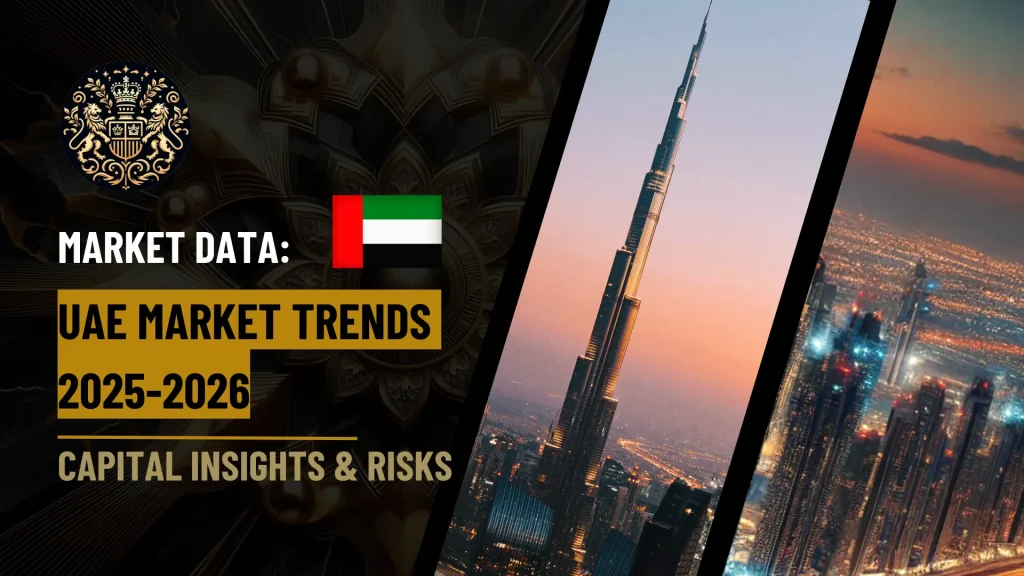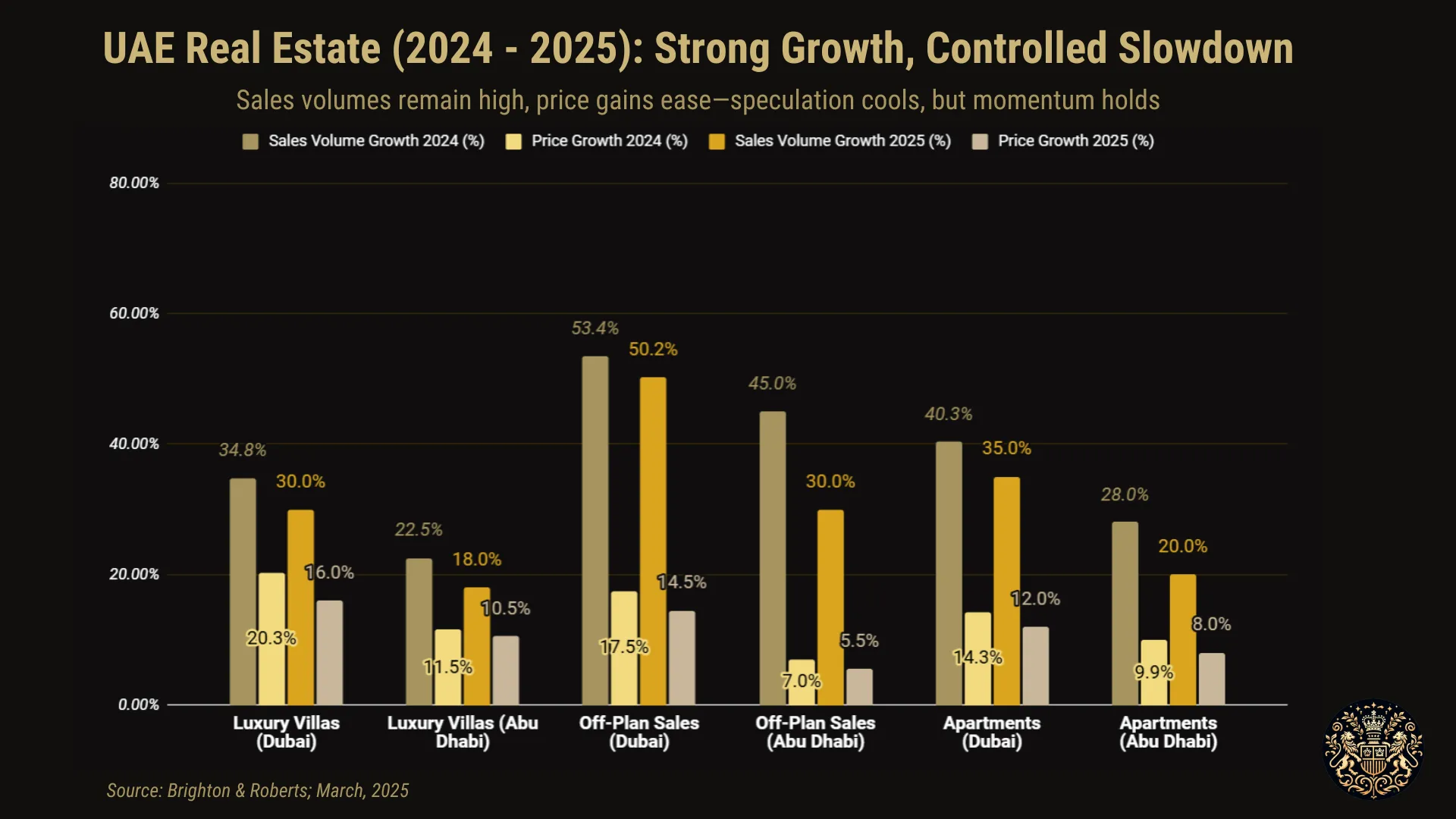UAE Market Trends 2025-2026

UAE Market Trends 2025-2026
Vital Capital Insights & Risks
Table of Contents
The Emirati skyline, shimmering beneath the desert sun, stands as a monument to wealth and ambition. From the spires of Dubai’s financial district to the oil-backed opulence of Abu Dhabi, the United Arab Emirates projects an aura of unstoppable growth. Investors see a haven—low taxes, aggressive expansion, and a leadership seemingly focused on future-proofing its economy. But beneath the polished veneer, risks lurk. Unseen by casual observers, the economic chessboard is shifting, and the next moves may not favor every player.
Growth at Full Throttle—For Now
The numbers are formidable. At $510 billion in GDP (2024), the UAE is the second-largest economy in the Gulf Cooperation Council, its trajectory promising. The International Monetary Fund projects 6% growth in 2025 (CBUAE) and 5.1% in 2026. The country’s financial lifeline—its non-oil sector—is expanding at 5.3% annually, a testament to its diversification strategy. But the rivals are closing in. Saudi Arabia, with its $1.1 trillion GDP, has ambitions far greater than simple economic dominance—it wants to rewrite the region’s investment map. And it is willing to pay dearly to do it.
Compared to other emerging markets, UAE’s economy is larger than Singapore’s ($490 billion) but smaller than South Korea’s ($1.7 trillion). This scale provides a strategic advantage in trade and investment flows, though regional competition is intensifying
Brighton & Roberts thoughts
The UAE remains a growth leader, but Saudi Arabia’s aggressive Vision 2030 strategy is creating a regional power struggle. Investments in fintech, industrial zones, and digital transformation will thrive—but only for those agile enough to navigate a shifting competitive landscape.
Foreign Investment: Saudi HQ Law Disrupting Capital Flows
The UAE’s foreign direct investment inflows stand at $24.5 billion in 2024 (+10.3% YoY). An enviable figure, but one that now faces disruption. Saudi Arabia’s Foreign Direct Investment (FDI) has surged to $30 billion, surpassing the UAE for the first time. The game has changed. Riyadh’s decree forcing multinational corporations to establish regional headquarters in Saudi Arabia or forfeit government contracts is not just economic maneuvering; it is a direct challenge to Dubai’s status as the Middle East’s financial capital.
Key Data:
- Dubai’s fintech dominance remains intact, with $1.7 billion in venture funding in 2024, but regulatory incentives in Riyadh are eroding its first-mover advantage.
- A $5 billion capital shift. Conservative estimates suggest that Saudi incentives could redirect up to $5 billion in annual corporate investments away from the UAE by 2026. Saudi’s localization push is forcing multinationals to rethink their regional strategy
- Saudi FDI inflows: $30 billion in 2024, overtaking UAE for the first time.
Risk Factors:
- Saudi’s localization push is forcing multinationals to rethink their regional strategy.
- UAE is adapting through regulatory incentives including new free-zone tax benefits and expanded Golden Visas for high-net-worth investors, but the pressure is mounting and that may impact long-term corporate commitments.
Brighton & Roberts thoughts
Fintech, logistics, and AI-driven banking remain hot sectors, but investors must weigh UAE’s evolving tax framework against Saudi Arabia’s aggressive incentives. The playing field is tilting.
The Real Estate Frenzy—A Market on the Edge
If history has a lesson, it is this: nothing rises forever. Dubai’s real estate market, fueled by speculative money and ultra-high-net-worth inflows, is riding an unsustainable high. Luxury property transactions are up 34.8% year-on-year, while villa prices have soared by 25.3%. Off-plan sales—often a barometer of speculation—are up 53.4% for 2024 and we expect them to slightly cool off to 50.2% in 2025.
But beneath the record-breaking deals lies a simple truth: property values are outpacing income growth by 15-20%. The bubble might be inflating, and if it pops, liquidity will be the first casualty.
Risk Factors:
- Rising mortgage costs & potential regulatory cooling measures could slow speculative demand.
- Global liquidity tightening may limit foreign investment in real estate.
Key Data:
- Dubai residential transactions: +34.8% YoY in H1 2024.
- High-end property segment: Off-plan sales: +53.4% YoY (2024), cooling to +50.2% in 2025. Speculative demand remains strong but shows signs of moderation.
- Abu Dhabi rental market: Apartment rental index up 6.8% YoY, villa rental index up 5.3% YoY in H1 2025.
Brighton & Roberts thoughts
Short-term gains remain strong in luxury developments, but we think capital owners might want to watch for tightening mortgage conditions, declining rental yields, and possible tax regulations to curb speculation.

Banking & Fintech: UAE Faces Saudi Competitive Pressure
The UAE’s banking sector remains robust. Loan growth stands at 6.9% year-on-year, and deposit growth at 8.7%, driven by SME lending, real estate financing and private credit expansion. But the real story is in digital finance. Fintech adoption among UAE residents has soared from 42% in 2022 to 60% in 2024. Traditional banks are scrambling to integrate AI-driven credit models before nimble fintech disruptors swallow market share.
But there’s a catch. The UAE’s new corporate tax (9%) may not stop at businesses. If extended to ultra high-net-worth individuals, the estimated tax burden could reach 2% of net assets—a move that could trigger capital flight.
Key Data:
- Loan growth: 6.9% YoY (2024), mainly in SME and real estate financing.
- Digital banking adoption: 60% of UAE residents use fintech solutions, up from 42% in 2022.
- Saudi fintech market growth: Expanding aggressively, challenging UAE’s dominance.
Risk Factors:
- Tighter AML regulations could slow fintech expansion.
- Increased Saudi fintech investment may attract regional startups away from UAE.
Brighton & Roberts thoughts
We see that short-term gains remain strong in luxury developments. Might be a good strategy to watch for tightening mortgage conditions, declining rental yields, and possible tax regulations to curb speculation.
Regulatory Shifts: The Silent Game-Changer
Regulation is the one factor investors often underestimate—until it upends the market. The UAE, long known for its business-friendly environment, is adjusting its approach
Key Data:
- Corporate tax (9%) now applies to all businesses.
- High-net-worth tax risk. Levies on ultra-wealthy individuals could emerge by 2026.
- Golden Visa expansion. The UAE is targeting AI, fintech, and industrial investors with long-term residency incentives.
- Saudi-UAE regulatory divergence. Riyadh’s mandatory regional HQ requirement is an existential challenge to Dubai’s free-zone dominance.
Brighton & Roberts thoughts
The UAE remains one of the world’s most business-friendly environments, but it is always a good idea to better stay ahead of tax and ownership reforms that could reshape vital capital flows.
Final Thoughts: UAE—Still Strong, But Under Pressure
The UAE is not losing its edge—it is evolving. The golden days of effortless growth and unchecked tax advantages are fading, replaced by a more sophisticated, more competitive landscape. Investors who adapt will reap the rewards. Those who rely on old paradigms may find themselves outmaneuvered.
Key Data:
- Fintech & AI: Digital lending, wealth management, and payment platforms remain prime investment targets.
- Trade & Logistics: UAE’s $490 billion trade expansion is fueling demand for logistics hubs and cross-border payment systems.
- Luxury Real Estate: A magnet for ultra-high-net-worth capital—until the market cools.
- Alternative Lending: Private credit & SME lending platforms offer lucrative returns amid rising traditional bank costs.
- Regulatory Navigation: The tax landscape is shifting. Investors must anticipate—not react.
Risks & Concerns:
- Risks: The UAE remains a top-tier investment hub, but Saudi HQ policies, tax shifts, and real estate affordability are changing the equation.
- Concerns: Speculative real estate, fintech competition, and uncertain tax frameworks.
- Adapt or fall behind. Investors who ignore shifting policies risk being left exposed.
- Best sectors: AI-driven finance, logistics, trade, and high-end real estate.
The UAE remains a financial powerhouse, but this is no longer a game for passive investors. The question isn’t whether the UAE will remain a financial force—it will. The real question is—who will capitalize on the next move?
Additional data links:
United Arab Emirates Ministry of Finance
United Arab Emirates Labour Market Observatory
Disclaimer: The information provided is for informational purposes only and does not constitute financial, investment, or other professional advice. Readers should consult with a qualified professional before making any investment decisions. The authors and publishers are not liable for any losses or damages arising from the use of this information.
